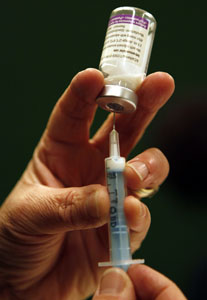
© JERRY LAMPEN/Reuters/Corbis
In response to an investigation published last week in the British Medical Journal (BMJ) which pointed to affiliations between World Health Organization (WHO) advisers and pharmaceutical companies manufacturing H1N1 flu vaccines, WHO inspector general Margaret Chan said that industry ties had no impact on the global health agency’s decision to elevate the swine flu outbreak to global pandemic status.
The investigation, conducted jointly by BMJ and the Bureau of Investigative Journalism in London, pointed out that three of the scientists advising the WHO on H1N1 had ties to manufacturers of the oseltamivir or zanamivir vaccines. What’s more, while those individuals had declared their affiliations in previous academic work, no such declaration was made by the WHO. The investigation also pointed out that the organization never disclosed the identities of 16 members of an Emergency Committee formed to guide H1N1 policy.
In an editorial accompanying the investigation, BMJ editor in chief Fiona Godlee said the revelation of pharmaceutical company ties had “badly damaged” WHO credibility.
Yesterday Chan adamantly denied that drug company ties had any impact on WHO decisions, the Associated Press reports. Chan said:
“At no time, not for one second, did commercial interests enter my decision-making.”
The AP reports that a 29-member expert panel is currently investigating the WHO’s handling of the swine flu outbreak, and results of that inquiry are expected sometime next year. Chan told the AP that the WHO will incorporate those findings into future pandemic declaration protocol:
“Should this committee decide that the current definition of a pandemic and the phases leading up to its declaration need to be tightened or otherwise revised, this will be another recommendation that we will welcome, and act on.”
Last Friday the Council of Europe released a report criticizing WHO handling of the swine flu pandemic. The report concluded that the health organization’s decision to elevate the H1N1 outbreak status to the level of global pandemic ultimately created disproportionate fears and cost European nations huge sums of public money.

